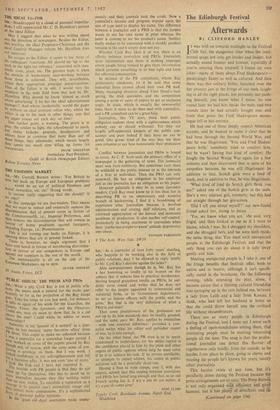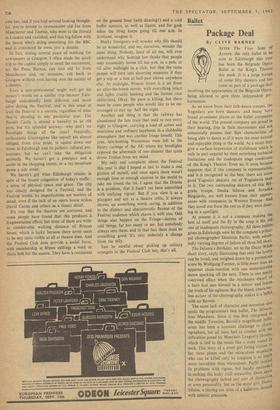The Edinburgh Festival
Afterwards
By CLIFFORD HANLEY
TT was well on towards midnight in the Festival 'Club bar, the dangerous time when the intel- lectual quips not only get louder and louder, but actually sound funnier and funnier, especially if you're uttering them yourself. I found my own jokes—many of them about Fred Shakespeare— paralysingly funny as well as cultured. And then there was this solitary bloke, hunched over the bar counter just at the fringe of our mob, laugh- ing in all the right places, but privately, not push- ing himself, you know what I mean. So one round later we had him inside the mob, and two rounds later he had actually bought one, and from that point the Fred Shakespeare mono- logue fell to bits entirely.
He had one of those deeply suspect American accents, and he wanted to make it clear that he had been through the Second World War, and that he was illegitimate. 'You and Fred Shakes- peare both,' somebody tried to comfort him, but he wasn't having that kind of comfort. He fought the Second World War again for a few minutes and then discovered that in spite of his unspoken heroism, he was still illegitimate. In addition to that, Scotch girls were a load of trash, and in addition to that, he was illegitimate.
'What kind of load do Scotch girls think you are?' asked one of the Scotch girls in the mob. She's a very tolerant girl, normally, but this had cut straight through her gin-screen.
'Did I tell you about myself?' our new-found friend asked her, trying to focus.
`Yes, we know what you are,' she said, very, frigid, and then looked at me as if I were to blame, which I was. So I shrugged my 'shoulders, and she shrugged hers, and we were both think- the same thing, that You meet such unexpected people at the Edinburgh Festival, and that the only thing you can do about it is sidle away gently and hide.
Meeting unexpected people is, I take it, one of the fringe benefits that festivals offer, both to native and to tourist, although it isn't specifi- cally stated in the brochures. On the following evening, while attending the play, alone, I became aware that a lifelong cultural friendship was springing up in the row behind me, between a lady from Leith and a lady from Kansas, I think, who had left her husband at home so that she could throw herself into the civilised life without encumbrances.
There are so many people in Edinburgh
during the Festival, and I must say I sense such a feeling of open-mindedness among them, that interesting people must be meeting interesting people all the time. The snag is that the profes- sional journalist can detect this flavour of togetherness only briefly, from the outside, as he hurtles from place to place, going to shows and meeting the people he's known for years, mostly other journalists.
This barrier exists at any time, but it's peculiarly dense during the Festival because the press arrangements are so cosy. The Press Bureau is not only organised with efficiency and good humour, but it has plenty of armchairs and is
(Continued on page 334) own bar, and if you loaf around looking thought- ful, you're bound to re-encounter old Joe from Manchester and Tootsie, who went to the Herald in London and vanished, and that big fellow with the beard who's doing something for the BBC and is convinced he owes you a double.
In fact, during several years of working for newspapers in Glasgow, I often made the quick trip to the capital simply to smell the excitement, try the Press Bureau, run into old Jo from Manchester and, on occasion, roll back to Glasgow without even having seen the outside of a theatre.
Even a non-professional might well get his money's worth on a similar trip because Edin- burgh undoubtedly feels different and more alive during the Festival; and in this sense at least the Festival is a success, regardless of what they're showing in any particular year. -I he floodlit Castle is almost a banality to us old pros, but it's splendid anyway—why don't we floodlight things all the time? Naturally, enthusiastic Glaswegians like myself are almost obliged, from civic pride, to squint down our noses at Edinburgh and its pathetic cultural pre- tensions, but we can't take the obligation seriously. We haven't got a precipice and a castle in the shopping centre, or a toy mountain down a side street.
We haven't got what Edinburgh retains in spite of the insane congestion of today's traffic: a sense of physical space and grace. The city was clearly designed for a Festival, and the Festival works. Its imperfections are matters of detail, even if the lack of an opera house strikes David Cairns and others as a titanic detail.
It's true that the theatres are scattered, and some people have found that this produces a fragmentation effect, but most of them are with- in comfortable walking distance of Princes Street, which is lucky because there never seem to be any taxis visible at all at theatre time. And the Festival Club does provide a social focus, with membership at fifteen shillings a week or thirty bob for the season. They have a restaurant
on the ground floor (with dancing!) and a cold buffet upstairs, as well as liquor, and for gosh sakes the thing keeps going till one a.m. In Scotland, imagine it.
Narky foreigners will wonder why this should be so wonderful, and we, ourselves, wonder the same thing. Nobody, least of all me, will ever understand why Scottish law thinks that people may reasonably booze till ten p.m. in a pub, or till after midnight in a club, but that the same people will turn into slavering monsters if they get a nip or a bite at half-past eleven anywhere else. At midnight, Princes Street is a set from an after-the-bomb movie, with everything intact and lights crazily burning and the human race obliterated. Okay, the pace is killing, but there must be some people who would like to be en- couraged to stay up half the night.
Another sad thing is that the railway has abandoned the late train that used to run every night to Glasgow, carrying a load of actors and musicians and ordinary layabouts in a clubbable atmosphere that was another fringe benefit. This year, late-homing Westerners were left to the bleary carnage of the A8, where my headlights exposed the aftermath of one disaster that quite drove Troilus from my mind.
My only real complaint about the Festival this year is that I hoped at last to make a real glutton of myself, and once again there wasn't enough time or enough stamina in the world to take me round the lot. I agree that the Drama is a problem, that it hasn't yet been assembled with unifying vigour. But if you view it as a playgoer and not as a theatre critic, it always throws up something worth seeing, in addition to the distinct and characteristic flavour of the Festival audience which shares it with you. Odd things also happen on the Fringe—dozens of odd things, far too many to see, but somebody always sees them, and in that fact there must be something good. It's very definitely a change from the telly.
Just be careful about picking up solitary strangers in the Festival Club bar, that's all.



































 Previous page
Previous page